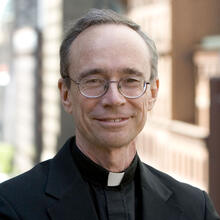(RNS) — Few parishioners want to see their parishes turned into partisan battlefields, but with the Catholic community almost evenly divided between Republicans and Democrats, some parishes face this danger. Both campaigns are appealing to Catholic voters because shifting a small percentage of Catholics in key battleground states could determine the outcome of the presidential election.
One wedge issue, especially since President Donald Trump’s nomination of Judge Amy Coney Barrett to the Supreme Court, seems to be anti-Catholicism. Twitter, Facebook and other social media platforms are also bristling with toxic comments about who is a good or bad Catholic and what issues are crucial for Catholics in the election.
A few priests enjoy pontificating on politics from the pulpit, but they tend to be the exception. The natural response of a Catholic pastor is to hide in the rectory basement and wait for the election to pass.
Other than hiding in the basement, what can parishioners ask their pastors to do to keep their parishes from turning into partisan war zones?
First, avoid politics in your sermons.
According to the Pew Research Center, 76% of Catholics do not want to hear partisan endorsements from the pulpit. Only 53% percent say they share the opinions of their clergy when politics are discussed, the lowest number for any denomination.
If you want to avoid trouble, never mention the candidates’ names, never mention a political party. It is appropriate to encourage people to vote and to talk about issues, but don’t let your parishioners know how you are going to vote.
And if you preach on issues, preach on the full spectrum of Catholic social teaching, not on just a single issue. If all you preach on is capital punishment, you are signaling your support for the Democrats. If all you preach on is abortion, you are signaling your support for Republicans.
Second, keep partisan politics out of the parish bulletin and the parish website.
In the run-up to the election, it would be best only to use material from the U.S. Conference of Catholic Bishops or from your state Catholic conference. Provide quotes from and links to “ Faithful Citizenship,” “ Laudato Si’,” “ Fratelli Tutti ” and other official documents but not material from other groups no matter how “Catholic” they claim to be.
A useful one-page bulletin insert is available from the USCCB.
Do not let any other organization, not even pro-life or social justice groups, have space in your bulletin or website prior to the election.
If it comes from the bishops, you are probably safe, but if it comes from anyone else, watch out.
Third, train the ushers to protect the church from partisan materials.
Tell the ushers to keep an eye out for leaflets and other political materials in the back of the church. It is easy for someone to put a pile of flyers on a table in the back of the church, which your parishioners will think came from you or your bishop. Tell the ushers to confiscate any material you have not personally approved. The church building is private property, and you have the right to exclude anyone who is invading your space with politics.
Fourth, appoint people to keep an eye on the parking lot.
Political campaigns target church parking lots by putting flyers on windshields. Again, the parking lot is private property. Your delegates should tell them they are trespassing and should leave. The pamphlets should be removed before people get to their cars at the end of Mass.
You cannot stop people from distributing material on the public sidewalk, but church property can be a politics-free zone.
Fifth, review the USCCB “ Do’s and Don’ts Guidelines During Election Season ” to see what is possible and what is to be avoided.
For example, it states parishes can
- Address the moral and human dimensions of public issues.
- Share church teaching on human life, human rights, and justice and peace.
- Apply Catholic values to legislation and public issues.
- Conduct a nonpartisan voter registration drive on church property.
- Distribute unbiased candidate questionnaires covering issues of human life, justice and peace that have been reviewed and approved by your diocesan attorney.
- Check with your diocesan attorney if you have any questions about what is appropriate.
The guidelines warn parishes not to
- Endorse or oppose candidates for political office.
- Distribute partisan campaign literature under church auspices.
- Arrange for groups to work for a candidate for public office.
- Invite only selected candidates to address your church-sponsored group.
- Conduct voter registration slanted toward one party.
- Distribute a biased candidate survey.
It also recommends including the following announcement in parish bulletins and websites:
We strongly urge all parishioners to register, to become informed on key issues, and to vote. The Church does not support or oppose any candidate, but seeks to focus attention on the moral and human dimensions of issues. We do not authorize the distribution of partisan political materials on parish property.
Most parishioners hope that politics do not invade their parishes, but the wise pastor prepares for the worst. Following this simple checklist will help parishes avoid trouble at election time.








